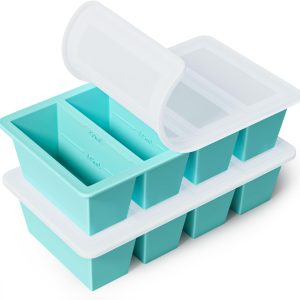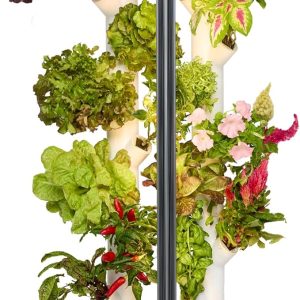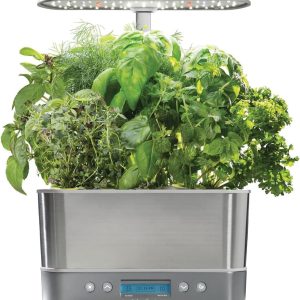Most of us want to do more to be more environmentally conscious. But it can feel overwhelming to make what seems like drastic changes. However, there are often small steps you can take – even in the kitchen – that are sustainable choices that save money, energy, and resources while still allowing you to enjoy delicious, home-cooked meals.
Many of these options may not work for your specific needs or home situation. I have a dog and a challenging laundry situation (ah, the joys of city apartment living) so, for me, giving up paper towels is not an option. Don’t judge me.
Here are some ways that you can make your kitchen greener while benefiting both your wallet and the planet. Most of these are simple shifts – both in mindset and routine – to get you started. Baby steps!
Reduce Food Waste
- Plan meals ahead to buy only what you need.
- Store fruits and vegetables properly to extend freshness (keep herbs in water, store potatoes in a dark place).
- Use AI-powered grocery list apps to track pantry items and avoid overbuying.
- Label leftovers with dates and use them before they go bad.
- Repurpose scraps by turning vegetable peels into broth or stale bread into croutons.
Benefits: Saves money, reduces waste in landfills, and minimizes methane emissions from decomposing food.
Compost Kitchen Scraps
- Set up a small compost bin on your counter or under the sink.
- Compost fruit peels, coffee grounds, eggshells, vegetable scraps, and tea bags.
- If you have a backyard, invest in a composting system to create nutrient-rich soil for gardening.
Benefits: Keeps food out of landfills, reduces greenhouse gases, and enriches soil naturally.
Use Sustainable Cookware & Kitchen Tools
- Choose cast iron, stainless steel, or ceramic cookware instead of nonstick pans with harmful coatings.
- Use wooden or bamboo utensils over plastic.
- Opt for silicone baking mats instead of disposable parchment paper.
- Invest in reusable food storage bags instead of plastic zip bags.
Benefits: Reduces reliance on plastic and chemicals, saves money on replacements, and lowers landfill waste.
Lodge 10.25 Inch Cast Iron Pre-Seasoned Skillet
Original price was: $34.25.$19.90Current price is: $19.90. -42%Reduce Single-Use Plastics
- Replace plastic wrap with beeswax wraps or silicone stretch lids.
- Buy pantry staples in bulk with reusable containers.
- Switch to glass, stainless steel, or silicone storage containers.
- Use a reusable grocery bag and produce bags when shopping.
Benefits: Cuts down on ocean pollution, reduces microplastics in food, and decreases demand for oil-based plastics.
Silicone Stretch Lids for Food Storage
Original price was: $19.99.$15.99Current price is: $15.99. -20%Conserve Water While Cooking & Cleaning
- Use a bowl to wash produce instead of running water continuously.
- Collect leftover pasta or veggie cooking water to water plants.
- Run the dishwasher only when full instead of multiple small loads.
- Keep a pitcher of drinking water in the fridge instead of running the tap to cool it.
Benefits: Saves gallons of fresh water, reduces water bills and conserves natural resources.
Eat More Plant-Based Meals
- Start with Meatless Monday or reduce meat intake gradually.
- Try plant-based proteins like beans, lentils, quinoa, and tofu.
- Replace dairy with oat, almond, or soy milk.
- Make vegetable-forward meals with locally sourced produce.
Benefits: Lowers carbon footprint, conserves water and land use, and improves heart health.
Buy Local & Seasonal Produce
- Shop at farmers' markets or join a community-supported agriculture (CSA) program.
- Check labels for locally grown produce.
- Eat seasonal fruits and vegetables to avoid long shipping routes.
Benefits: Supports local farmers, reduces transportation emissions, and provides fresher, more nutritious food.
Use Energy-Efficient Cooking Methods
- Use lids on pots to speed up boiling.
- Cook in batches to maximize oven use.
- Use small appliances like air fryers, pressure cookers, or toaster ovens instead of heating a full oven.
- Turn off burners a few minutes before food is fully cooked (residual heat will finish the job).
Benefits: Reduces electricity and gas bills, cuts down CO₂ emissions, and speeds up cooking time.
Instant Pot Duo Plus 9-in-1: 6 Quart
Original price was: $129.99.$69.99Current price is: $69.99. -46%Make Your Own Kitchen Staples
- Make homemade broth from veggie scraps.
- Create your own salad dressings and spice blends instead of buying bottled versions.
- Bake your own bread or granola to avoid plastic packaging.
Benefits: Saves money, reduces packaging waste, and ensures fewer additives in your food.
Freeze Leftovers & Preserve Food
- Store leftover sauces, soups, and herbs in ice cube trays.
- Freeze extra fruit for smoothies instead of letting it spoil.
- Pickle, ferment, or dehydrate foods to extend shelf life.
Benefits: Reduces food waste, saves money, and allows you to enjoy fresh produce year-round.
Grow Your Own Herbs & Vegetables
- Start with easy-to-grow herbs like basil, mint, and rosemary on a windowsill.
- If space allows, plant tomatoes, peppers, or lettuce in a small garden or container.
- Regrow food scraps like green onions or lettuce in water.
Benefits: Saves money, reduces packaging waste, and provides pesticide-free produce.
AeroGarden Harvest Elite Indoor Garden Hydroponic System with LED Grow Light and Seed Kit
Original price was: $119.99.$80.09Current price is: $80.09. -33%Use Eco-Friendly Cleaning Products
- Swap chemical-heavy cleaners for vinegar, baking soda, and lemon juice.
- Use reusable cloths instead of disposable paper towels.
- Choose plant-based dish soap and biodegradable sponges.
Benefits: Reduces toxic runoff, cuts plastic waste, and keeps your home chemical-free.
Make Sustainable Seafood Choices
- Look for the MSC (Marine Stewardship Council) or ASC (Aquaculture Stewardship Council) label.
- Choose smaller fish (sardines, mackerel) over large predators (tuna, swordfish) for sustainability.
- Avoid overfished species and opt for wild-caught or responsibly farmed seafood.
Benefits: Protects marine ecosystems, supports responsible fisheries, and ensures healthier oceans.
By making small, sustainable changes in your kitchen, you can save money, reduce waste, and help protect the planet and still enjoy delicious home-cooked meals. Start by picking one or two eco-friendly habits and gradually build a greener kitchen that works for you.

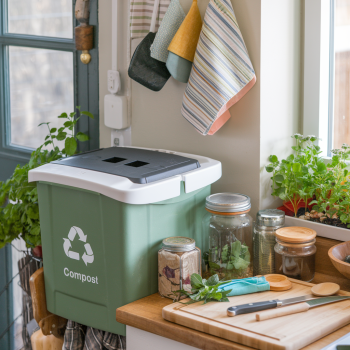
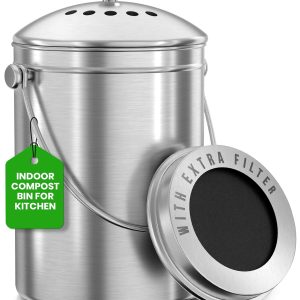








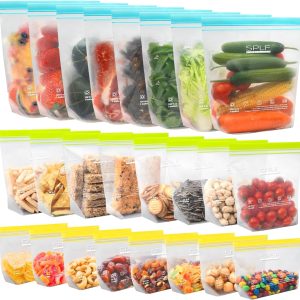













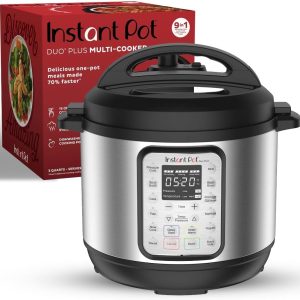








![[6 Pack] 16 oz. Regular-Mouth Glass Mason Jars](https://smarterhomecooking.com/wp-content/uploads/2025/02/glass-jars-1-300x300.jpg)
![[6 Pack] 16 oz. Regular-Mouth Glass Mason Jars](https://smarterhomecooking.com/wp-content/uploads/thumbs_dir/glass-jars-3-r0zck5ofk4ss2phkz7gynvoz2rjflrrwo20rzumzvc.jpg)
![[6 Pack] 16 oz. Regular-Mouth Glass Mason Jars](https://smarterhomecooking.com/wp-content/uploads/thumbs_dir/glass-jars-2-r0zck7k3xsvcpxeuo8a7sv7w9ja615zdcbbqy519u6.jpg)
